Need Help with AI Adoption or Development?
Contact our AI experts for free consultation.
The global AI footprint continues to spread rapidly. Here’s an updated overview of the AI ecosystem as of 2025:
An AI Company specializes in technologies like Machine Learning, Natural Language Processing, Computer Vision, predictive analytics, and others. AI companies can consult you on the most suitable AI solutions, select them, and integrate as well as create and implement custom AI solutions or improve yours.
Top AI companies and consulting firms like Ascendix are valuable partners in your digital transformation. We can help you avoid overpaying for unnecessary functionality and create an AI tool that meets your needs perfectly and integrates with your current system seamlessly. Our AI experts think out of the box and can improve initial plans and navigate you through pitfalls with our 20+ years of experience.
According to the latest available data, there are around 90,904 artificial intelligence companies worldwide. Approximately 29,618 of these, or about 32.5%, are based in the United States, which is home to leading AI companies like OpenAI, Anthropic, and Hugging Face.
As of now, there are approximately 10,000 to 58,000 AI startups worldwide, depending on how exactly the company identifies itself as an “AI startup.”
The United States dominates the field with 6,956 AI startups, accounting for more than half of this total. China follows with 1,605 startups, while the United Kingdom ranks third with over 800.

The 2025 AI Index Report features the number of newly funded AI companies by country:
The top three countries for AI are the United States, which continues to lead globally with over 6,000 AI startups and substantial private investment, China, which is ranked second with over 1,600 AI startups and strong government-backed AI initiatives, and the United Kingdom, which is third with over 800 AI startups and ongoing strategic investments projected to drive significant market growth by 2035.
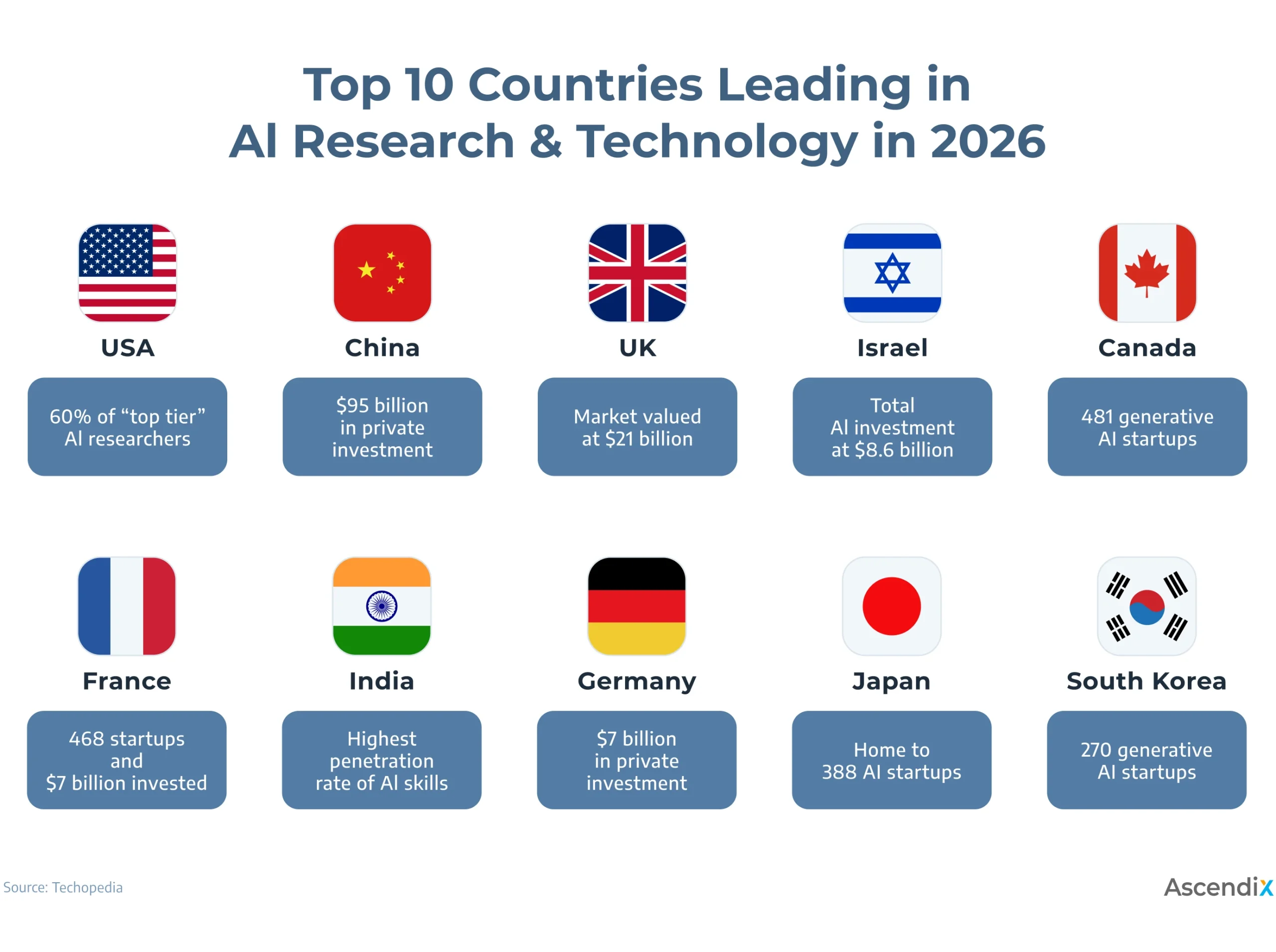
The United States is the best country for AI because of its substantial private investments and advanced AI infrastructure. Also, despite growing competition, the US is leading the AI race, powered by Silicon Valley’s innovation ecosystem and major tech giants like Google, Microsoft, Meta, and Amazon.
Key facts:
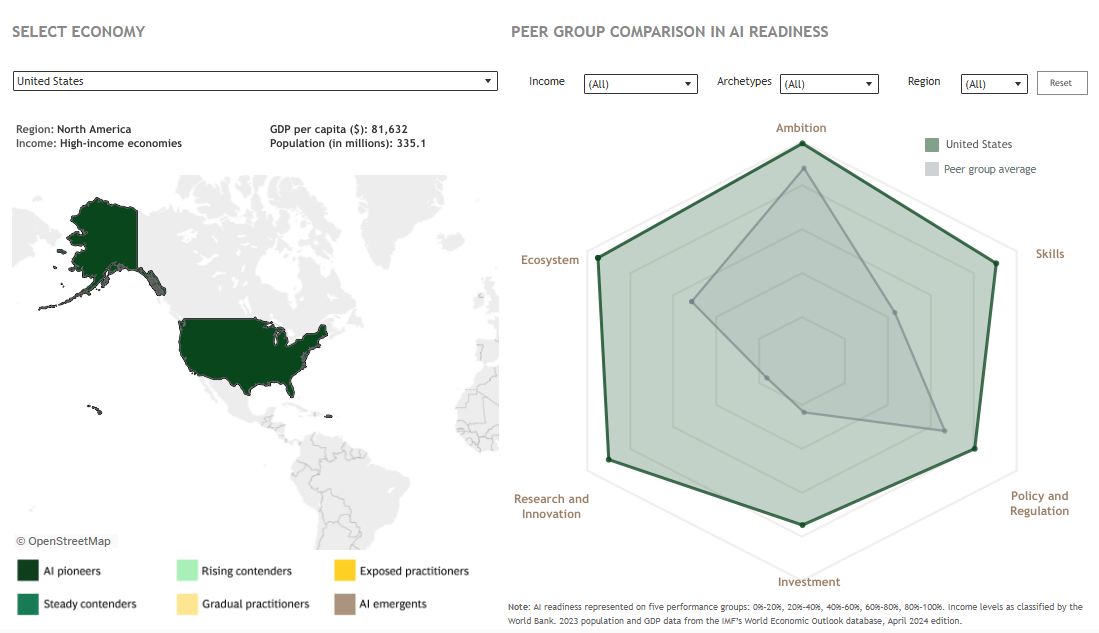
Source: The Boston Consulting Group (2024)
Also, the US government has established strict ethical regulations towards AI development as well as security standards. Last year alone, the total number of AI-related regulations grew by 56.3%. It might be challenging to meet all requirements at first, but with the help of AI consultants, it’s much easier.
Contact our AI experts for free consultation.
| Name | What It Does | Funding |
|---|---|---|
| Open AI | AI Model Developer | $40 B |
| Anthrophic | AI Model Developer and AI safety research | $20 B |
| Databricks | Enterprise AI and data analytics platform | $4B |
| Anduril Industries | Defence software and hardware | $30.5 B |
| Figure AI | Autonomous humanoid robots | $39 B |
| Cerebras Systems | Computer chip maker | $1 B |
| Insitro | Drug discovery and development | $643M |
| ScaleAI | Data labeling and software | $600M |
| Mistral AI | Open-source AI model research | $528M |
| Hugging Face | Library of AI models and databases | $395M |
| Glean | Enterprise search engine | $360M |
| Owkin | Drug discovery and development | $304M |
| Runway | Image and video editing software | $237M |
| Abridge | Medical conversation and documentation | $213M |
| Harvey | AI models for law firms | $106M |
So far this year, 35% of U.S. startup investment has gone to AI-related companies, per Crunchbase data. At the very top of the list of AI startups in 2024 is OpenAI, which has cemented its status as the largest AI research organization in the world and has landed 11.3 billion USD in 2024. Anthropic and Hugging Face rank further among ML startups due to successfully creating decent rivals for ChatGPT. Meanwhile, LLM startups such as Cohere and Character.ai are advancing conversational AI, making these technologies more accessible to businesses and developers.
Many large investors have shifted their attention to two particular fastest-growing AI startups: Pika and Mistral AI. Pika grew from a tiny 13-person team to a $250 million valuation in under a year using generative AI for video creation. Meanwhile, Mistral AI became a leader among LLM startups and was valued at $2 billion in less than 12 months with its alternative approach to ML research and models like the Le Chat chatbot.
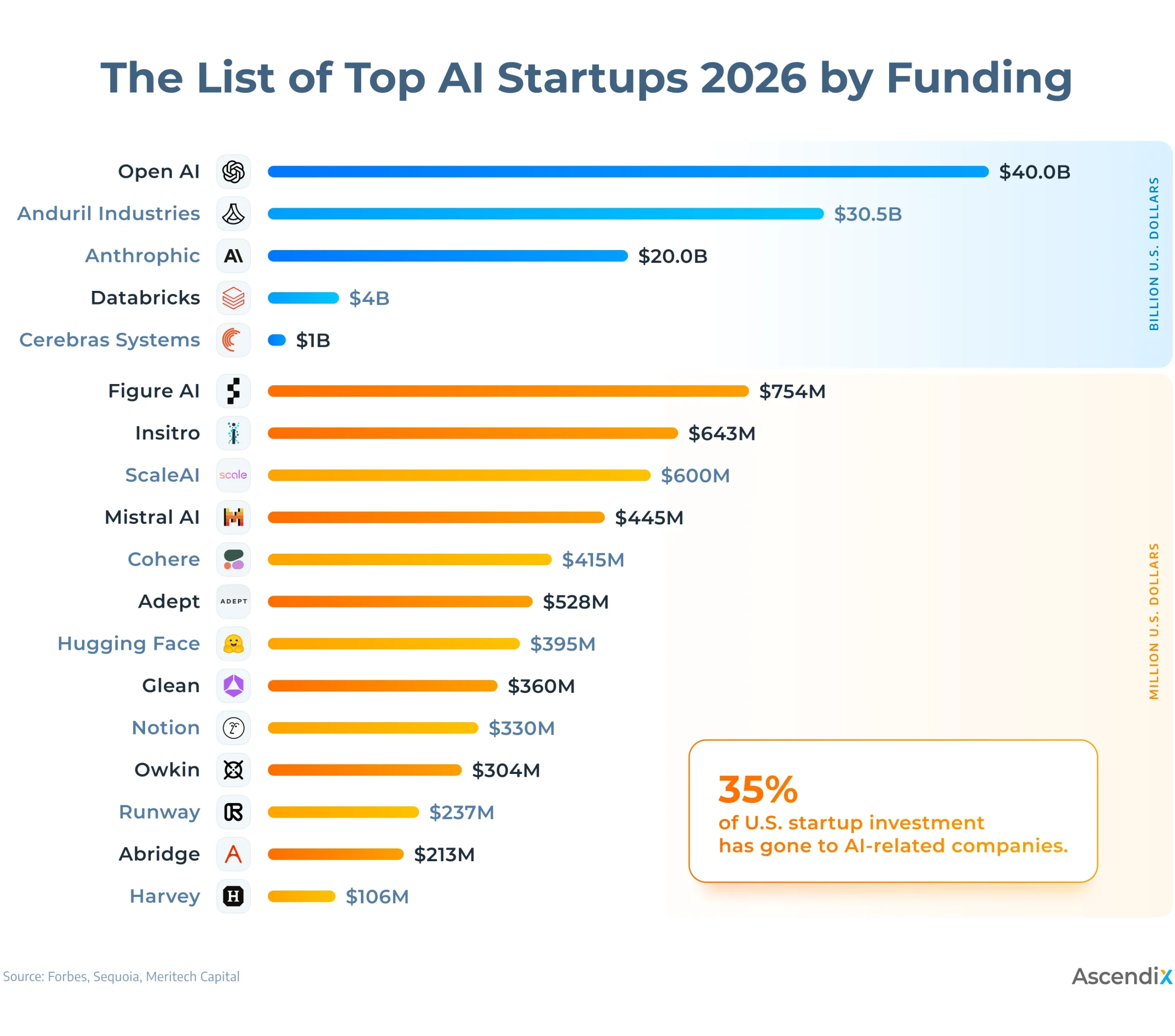
Top generative AI startups are Stability AI, Synthesia, and Tome. Stability, valued at $1 billion after raising $123.8 million since 2020, develops widely used image generation models like Stable Diffusion. London-based AI startup Synthesia uses $156.6 million in funding to synthesize realistic videos from text in multiple languages. Meanwhile, AI startup Tome has gathered $81 million to develop AI-powered presentation solutions that streamline visual content creation for remote and hybrid workers.
According to the latest estimations, the AI market size has reached over 638.23 billion USD in 2024. This rapid growth is expected to maintain and reach beyond 826 billion U.S. dollars in 2030 with a CAGR of 35.7%. Particularly, the US AI market is forecast to reach $299.64 billion by 2026 (source).
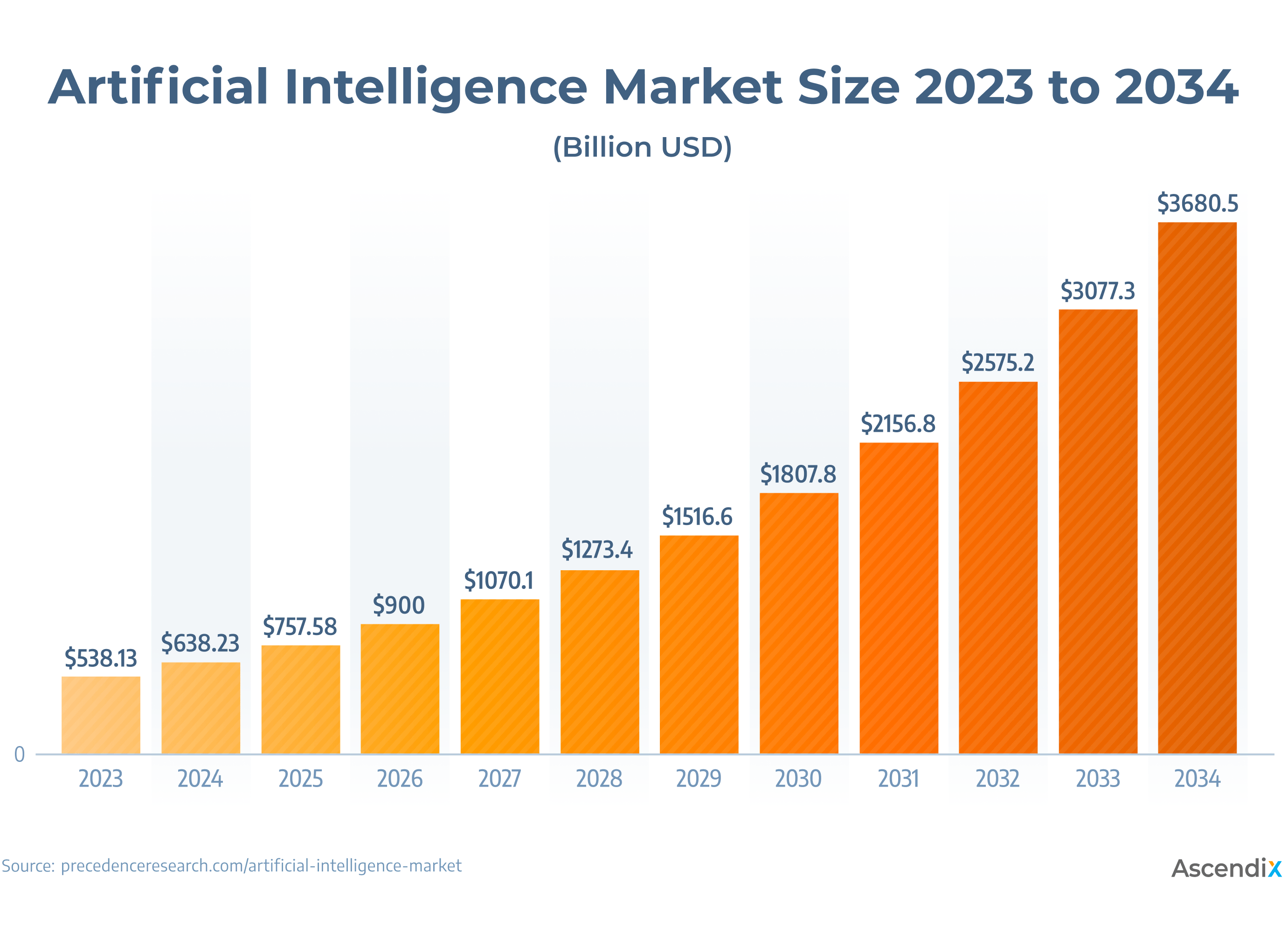
The biggest investment streams and the biggest number of AI companies are from the Asia-Pacific (26%) and North American (37%) regions with the United States and China as leaders. Latin America possesses about 14% and Europe 24%. According to Grand View Research, services (SaaS in particular) will be the most promising segment in the global AI market, with software in second place and hardware in third. That’s because cloud-based solutions are more convenient and do not require as many resources as software and hardware.
The size of the market for a particular AI technology is directly related to its perceived usefulness and applicability across various industries. A larger market size suggests higher demand.

Machine learning has the biggest market share among all AI technologies – almost 80 billion USD because it’s used in almost every available AI solution in the current market and has the potential to remain the basis for future ones for tasks like prediction, classification, and optimization.
Natural Language Processing is a basis for chatbots, sentiment analysis, language translation, and other applications with growing demand in customer service, marketing, and content creation. That’s why NLP has the second biggest market size of 36.42 billion USD among AI technologies. However, even there, machine learning is necessary as well as in generative AI.
Also, machine learning is the most mature technology which brings fewer investment risks and more knowledgeable specialists in the labor market. And again, ML is a huge accelerator for improving newer technologies like Computer Vision with a 25.80 billion USD market size.
Our ML consultants will create a strategic roadmap for the most efficient implementation.
The relatively smaller market size of AI Robotics (17 Billion USD) compared to other AI sectors like Machine Learning or Computer Vision isn’t necessarily due to a lack of interest or potential, but rather because of high complexity and even higher development costs.
Also, the applications of AI robotics have been primarily confined to industrial settings (e.g., manufacturing, and assembly lines). Expanding into new domains like healthcare, service industries, and consumer markets requires overcoming challenges related to cost, safety, and user acceptance.
As for 2024, even Tesla’s Optimus robots, the most expensive and advanced example of AI robotics for now, are assisted by humans. After it was revealed, the excitement of investors and the overall public was undermined. This incident is definitely going to influence the trust in AI robotics potential in 2026.
AI is versatile, but some industries have more use of it than others. The world has seen the potential of generative AI in the informational field, and after years of building elaborate policies and double-checking security, core industries have started to rely on AI solutions with more trust.
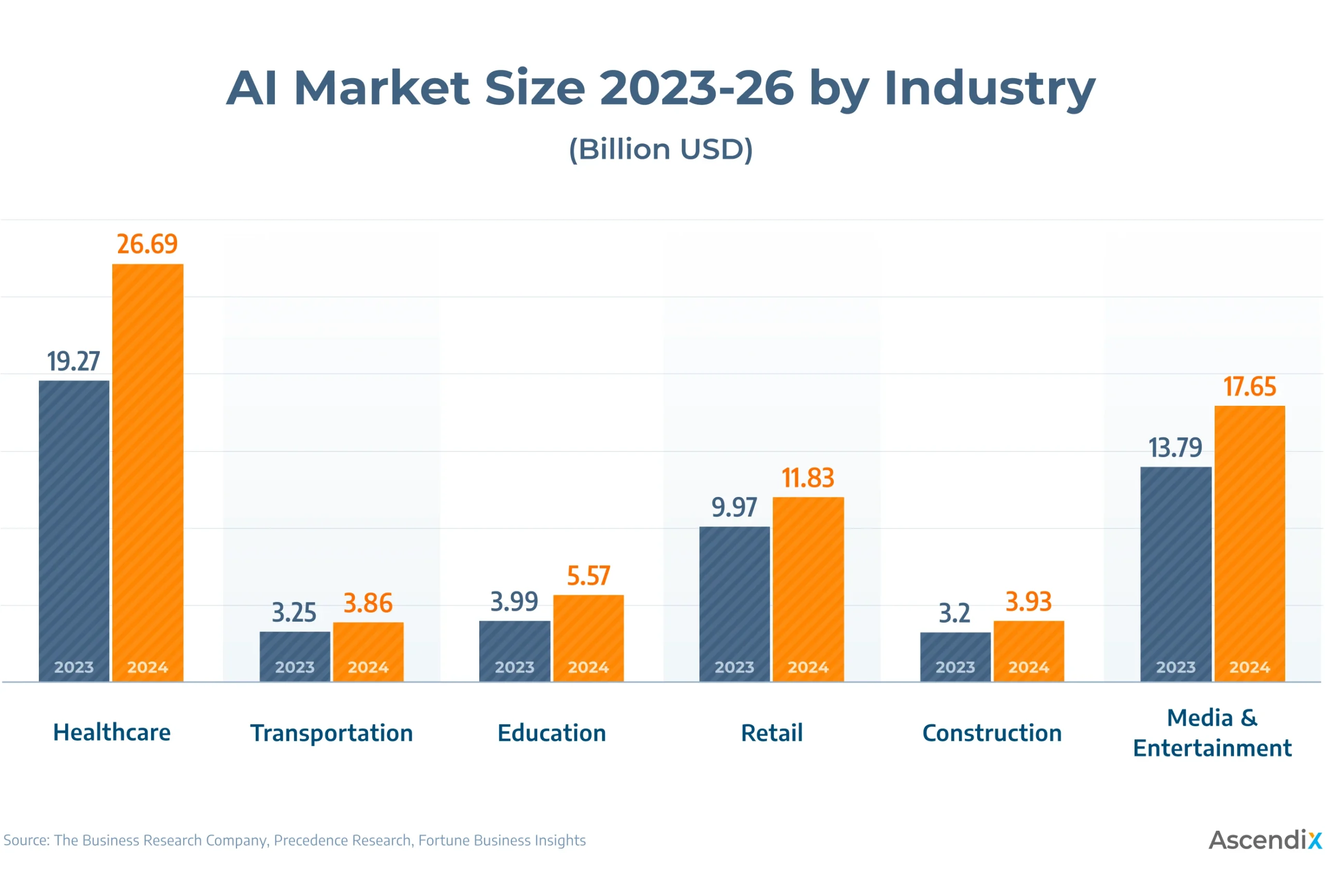
AI companies in healthcare are gaining momentum, with a $36.96 billion USD market size in 2025, driven by vast amounts of available data and the potential for improved patient outcomes, such as enhancing diagnostic accuracy, optimizing treatment plans, and predicting patient risks. Also, healthcare is often criticized because of lagging administrative efficiency, so many companies and governments see the potential to partially fix it through AI automation of scheduling, reminders, etc.
The media and entertainment industries are on top of the chart in terms of AI market share with $33.68 billion USD in 2025, because of the widely spread generative AI there. Social media content possesses the lion’s share of it.
The retail industry’s interest in AI is driven by mostly online marketplaces that steadily nurture its market size to about $14.49 billion USD in 2025. AI-powered recommendation engines and chatbots enhance customer experience and drive sales. It can also contribute to inventory management and supply chain optimization by predicting demand.
Transportation, education, and construction lag behind because of huge security concerns, strict regulations, and less data availability.
266 million companies are either using or exploring the use of AI. Having done the simple math, it’s over 82% of all companies in the world.
Among them, 92% of Fortune 500 firms have adopted AI. For example, Salesforce has embraced AI through two significant initiatives: Einstein and Agentforce. Now, users can use the help of advanced AI assistants for enhanced communication, data analysis, and automation. Walmart, Netflix, Coca-Cola, Ford, and many other industry giants reap the benefits of AI adoption.
Our AI experts will help you adopt AI to drive efficiency and automation.
Even if you as a customer do not see an AI touch, it is typically involved in increasing operational efficiency, facilitating communication, predictive market analytics, etc. The latest IBM AI Adoption Index reveals some unexpected patterns in how different countries are embracing artificial intelligence.
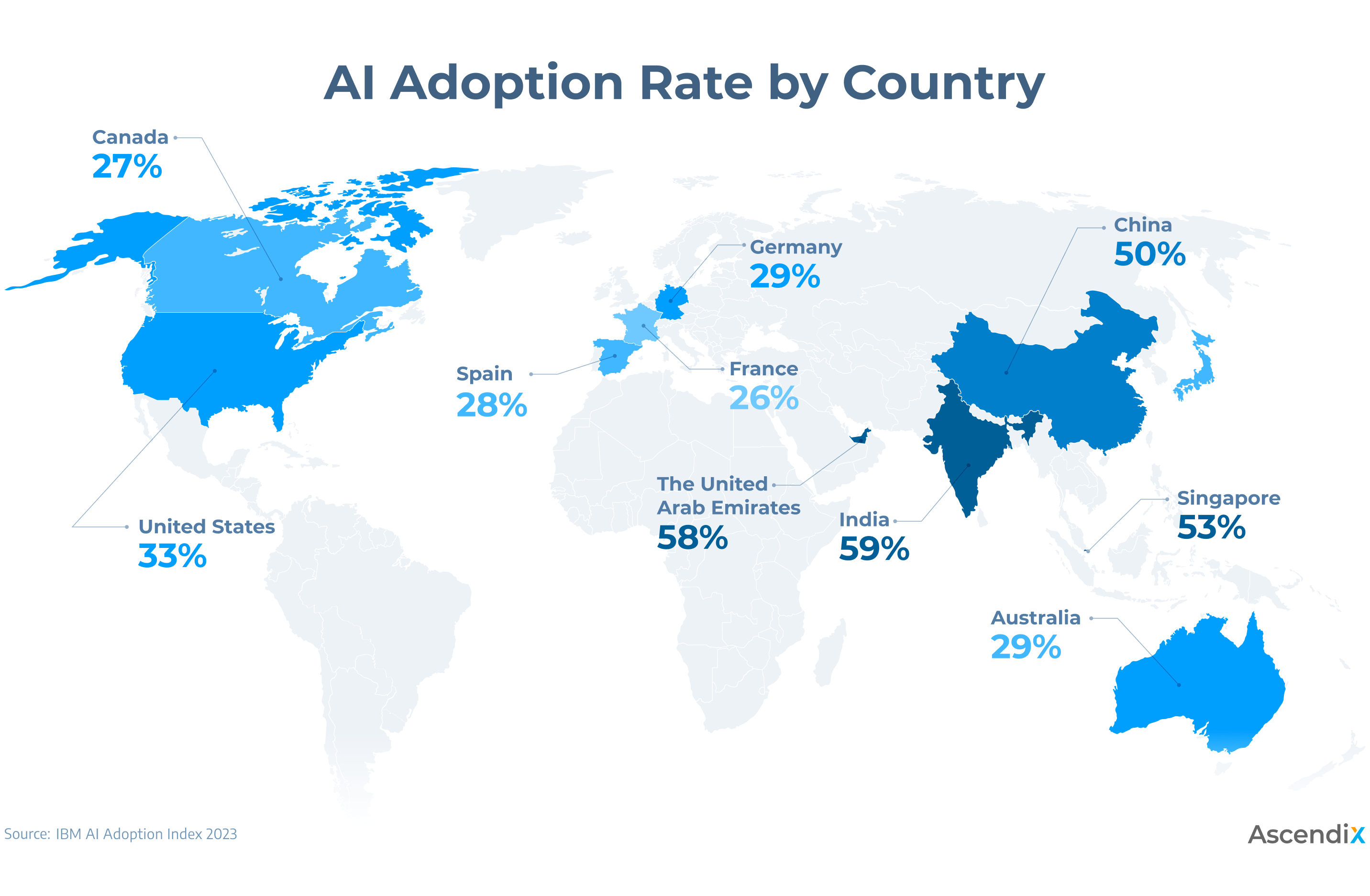
Surprisingly, it’s not Silicon Valley leading the AI revolution, but Asian countries. India tops the chart at a 59% adoption rate, followed closely by the UAE (58%), Singapore (53%), and China (50%). The United States, despite being home to tech giants like Google and Microsoft, shows only a 33% adoption rate.
Even more surprisingly, European tech powerhouses like Germany (29%) and France (26%) lag significantly behind Asian countries. European countries like Germany, France, and Italy are used to relying on traditional technologies or paper so they are much less eager to adopt AI. Italian government even temporarily banned ChatGPT in 2022 because of major security and ethical concerns. Australia has 29% AI adoption rate and Canada stays at 27%.
The country can adopt AI while still being unprepared for successful utilization because of a lack of policies and regulations, a significant skill gap, an undeveloped ecosystem, and an absence of innovation. Based on those criteria, The Boston Consulting Group has conducted the AI maturity assessment.
According to the data they gathered throughout 2024, AI pioneers are the USA, Canada, China, and the United Kingdom. Steady AI encounters are most Western and North European countries, such as France, Spain, Italy, Portugal, Switzerland, Belgium, Germany, the Netherlands, Sweden, Finland, Norway, and others, as well as Japan and Australia.
According to “The State of AI” research conducted by QuantumBlack (McKinsey), the most common utilization of Generative AI is in sales and marketing (42% on average across industries), specifically for generating texts and pictures.
Next on the list are product and service development (28%), IT (23%), service operations (22%), knowledge management (21%), and software engineering (18%). On average, Gen AI usage in human resources is 13%.
AI is not a popular tool in the risk, legal, and compliance field (11%), although 21% of surveyed financial services companies trust AI in this matter. Gen AI usage in strategy and corporate finance is also among the lowest, at 11%. However, 21% of surveyed companies in advanced industries, such as semiconductors, defense, and aerospace, use AI for strategizing and corporate finance.
Supply chain and inventory management (7%) and manufacturing (5%) are industries with the lowest AI adoption rate.
Also, this study showed the number of companies in a particular industry that use AI in at least one function:
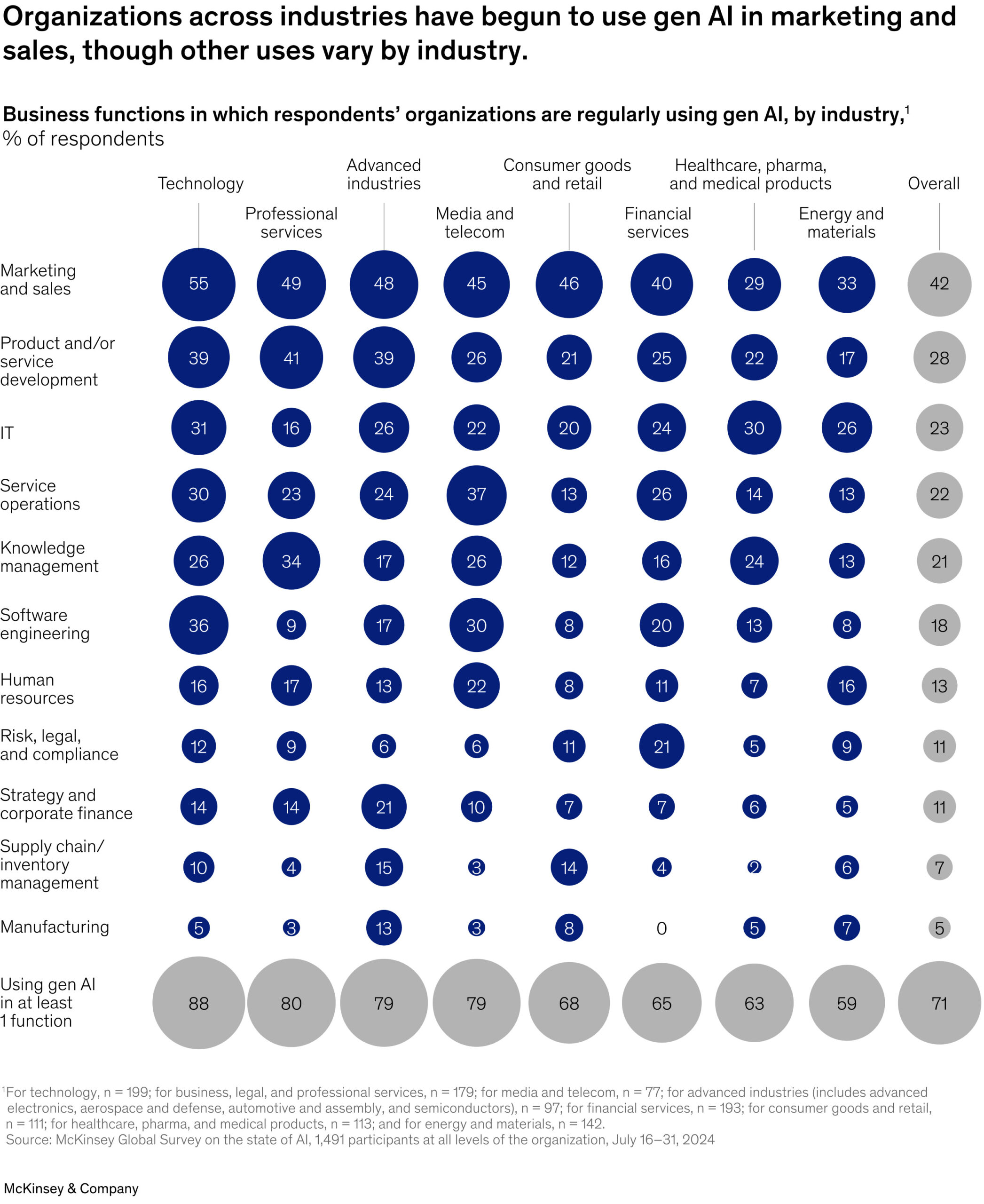
AI adoption by industries in different countries also varies, depending on existing development levels, priorities, and how opposed to changes the industry is. Since the United States is a leader in a number of AI companies with a 25% share (about 17,500 AI companies) and has already developed ethical and responsible AI practices, let’s see how well overall AI adoption is going there.
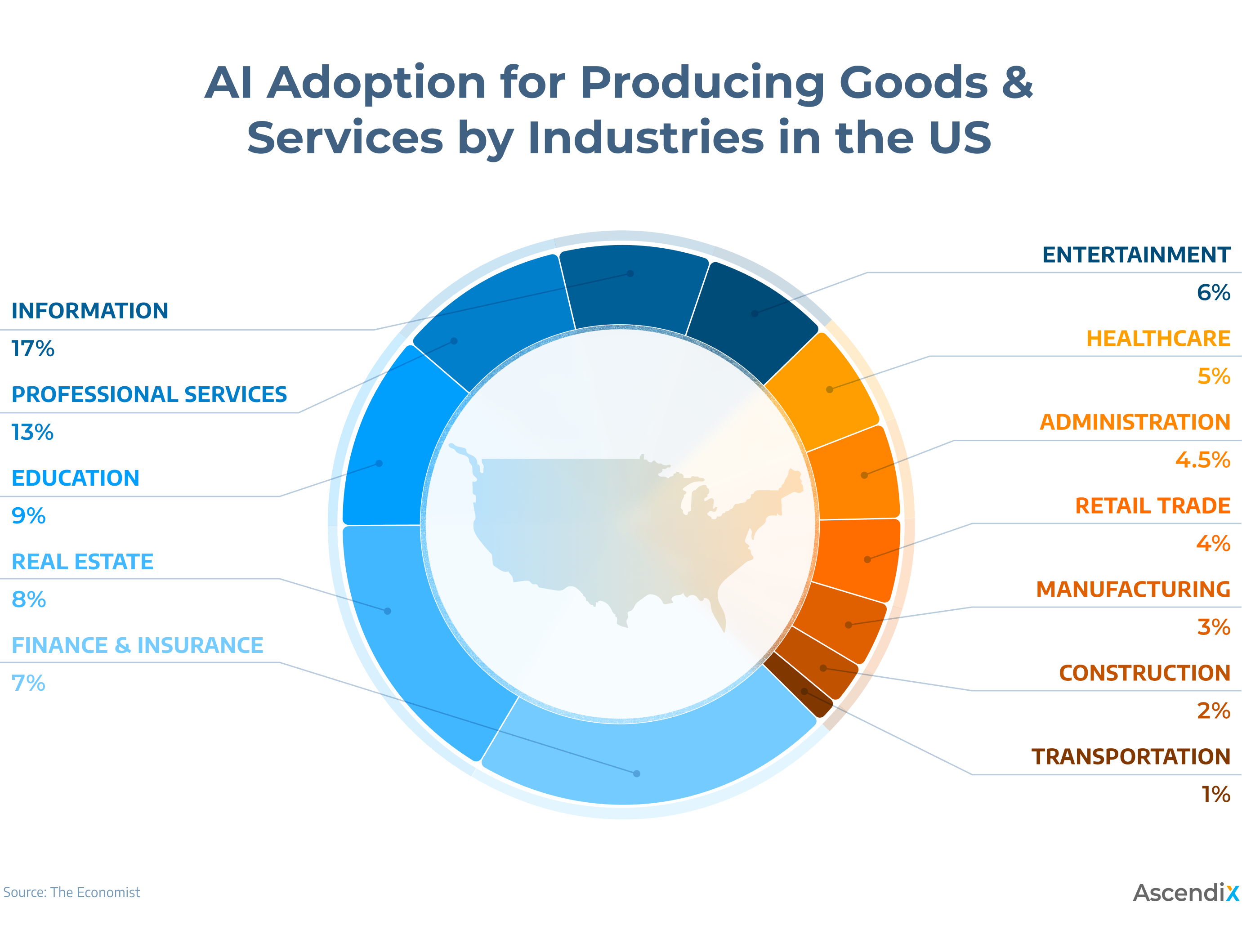
Information Technology leads the pack at 17%, which isn’t surprising. Professional services follow at 13%, leveraging AI for everything from data analytics to client service automation. Education (9%), Finance & Insurance (7%) and Real Estate (8%) show promising adoption rates, suggesting these traditionally conservative sectors are slowly but surely undergoing digital transformation.
Entertainment shows only a 6% adoption rate because the vast usage of generative AI in social media has not been included in this category. Slower adopters are critical sectors like healthcare (5%), manufacturing (3%), construction (2%), and transportation (1%) hindered by strict regulations.
Ascendix, a Dallas-based AI company, combines AI with real estate expertise to simplify document management and data processing. Our AI professional services can help you extract, validate, and structures data reducing manual work while maintaining oversight.
We’ve built custom AI solutions for property search, lease abstraction, property valuation, data entry, recommendation engines, and chatbots, based on our hands-on experience in real estate workflows. Internally, we integrate AI to improve efficiency: Fireflies.ai for call notetaking, our Internal AI Assistant for meeting summaries, GitHub Copilot for coding, and an HR AI chatbot to handle routine queries.
Contact out AI experts to find out all benefits generative AI can bring your business.
Investment tendencies towards AI have already been dubbed Silicon Valley’s trillion-dollar leap of faith. According to different calculations, the total investment amount in AI has already almost reached this bar.
Sam Altman, the CEO of OpenAI, has described his firm as “the most capital-intensive startup in Silicon Valley history” and it’s true since it has raised 13 billion USD in 2024 so far. Dario Amodei, the CEO of the rival start-up Anthropic, has predicted that a single AI model (such as, say, GPT-6) could cost $100 billion to train by 2027.
The global data center buildup over the next few years could require trillions of dollars from tech companies, utilities, and other industries, according to a July report from Moody’s Ratings.
From another perspective, Sundar Pichai, CEO of Google and Alphabet, claims that “the risk of underinvesting is dramatically greater than the risk of overinvesting” and explains the high numbers by spending money on infrastructure, hardware, and staff training. That’s why top AI startups have been counting new funding not in millions but billions of US dollars.
The latest quarterly data reveals $52.9 billion in combined capital expenditure from Meta, Amazon, Microsoft, and Alphabet, showcasing the intensity of the current tech arms race.
Meta has ramped up its capital investments significantly by heavily investing in its metaverse vision and AI capabilities. Microsoft and Alphabet show steady, calculated increases in their infrastructure spending. Amazon maintains the first position in spending, focusing on its vast warehouse network and AWS infrastructure.
Although AI has not experienced a bust on anywhere near the same scale as the railways or dotcom, the current anxiety is, according to some, nevertheless evidence of its coming global domination. The future of AI is just going to be like every other technology. There’ll be a giant expensive build-out of infrastructure, followed by a huge bust when people realize they don’t really know how to use AI productively, followed by a slow revival as they figure it out.
According to Noah Smith, we are currently at the first stage – building a foundation, which is the most expensive and time-consuming process. Unsurprisingly, sixty percent of a new CNBC Technology Executive Council survey respondents described their new AI investments as “accelerating.” Unfortunately, there is no guarantee that all those expenses will ever pay off.
AI seems to be losing popularity, but not funding. 50% of tech unicorns in 2026 are AI-related startups and attract billions of investment funds. The number of AI companies and products has been increasing and so has the advertisement. Try to look through social media or news feeds without at least one promotion of AI as an all-your-problem solver. The thing is that the effectiveness of AI is difficult to measure, so AI startups need to convince users of its viability.
Another burning question is what will happen when Large Language Models like ChatGPT exhaust the available data for training. That’s why tech experts advise focusing on data quality, not quantity. It caused a significant increase in investment in data-related AI startups.
The number of AI companies is increasing. As for 2026, it’s about 70K AI companies in the world. They bring new work positions and new job titles to the labor market. Unfortunately, there are still not enough knowledgeable AI specialists to fill all available positions. According to the Indeed survey, “AI” is being mentioned in job requirements more frequently, but not in CVs. This skill gap has not been eliminated yet, but about 80% of companies prioritize educating their existing staff about AI in the few next years, according to a WEF report.
Employees are also concerned about AI influence, especially:
The ILO Occupation Employment statistics show that concerns are not groundless. Over 30 million people have lost their jobs because of automation. Those are mostly data entry clerks, secretaries, cashiers, ticket clerks, material-recording and stock-keeping clerks, post office clerks, bank tellers, and related clerks. They have not been entirely removed, but automation of a significant part of their work allowed companies to hire fewer such specialists.
Our consultants know how to use AI in real estate inside out and will answer all your questions.
For 20 years, Ascendix has been a leader in business automation for the real estate industry. We’ve closely followed the evolution of AI and become experts in integrating it into versatile solutions. We’ve worked with prominent firms like JLL and Flibco, along with 300+ clients globally. Our 5 international offices provide us with a broad range of insights that we incorporate into our solutions.
According to the latest available data, there are around 70,000 artificial intelligence companies. Approximately 25% of these, or about 17,500, are based in the United States, which is home to leading AI companies like OpenAI, Anthropic, and Hugging Face.
An AI company is a business that specializes in the development, deployment, and commercialization of artificial intelligence (AI) technologies, such as machine learning, natural language processing, and computer vision. These companies often provide AI-powered products, services, or solutions to various industries.
According to Stanford’s 2024 AI Index Report, there are approximately 10,095 AI startups across the top ten countries leading in artificial intelligence innovation. The United States dominates the field with 5,509 AI startups, accounting for more than half of this total. China follows with 1,446 startups, while the United Kingdom ranks third with 727.
An AI startup is a newly formed business that focuses on developing and commercializing innovative AI technologies, products, or services. AI startups often aim to disrupt existing markets or create new ones by leveraging AI to solve complex problems or improve processes.
With expertise in real estate and technology, we deliver AI software, tailored to your business needs.
Kateryna is passionate about exploring proptech technology trends and innovative solutions for real estate. In her articles, she dives into the world of proptech to share industry news and insights to help modernize real estate workflows.
Get our fresh posts and news about Ascendix Tech right to your inbox.